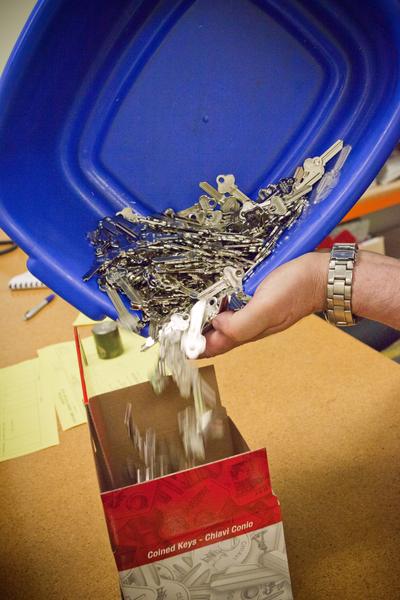LSC modernises operations, touts digital moves
- 16 March, 2017 11:21

When you think of digital transformation, locksmithing may not come to mind. But for the 90-year-old company, LSC (Locksmiths’ Supply Company), the journey to modernise and jump into the digital age is all encompassing, both in terms of updating internal operations and in educating locksmith customers.
Certainly, things have come a long way since its founder, Aubrey Findon Johnson, established the company in 1926 and imported the first code cutting machine for cylinder keys to Australia.
“Despite being a 90-year-old business we are a fast changing and evolving business around understanding the digital transformation of security,” LSC project team leader, Paul Newton, who’s spearheading technology management, implementation and leadership, told CIO Australia.
With strong associations and partnerships with the locksmithing, security, building and hardware industries, Newton said the company represents 160 manufacturers (30,000 hardware, software and service products), locally and overseas, and has operations in each state and a head office in North Melbourne with over 130 employees nationwide.

Eyeing internal operations, LSC selected Epicor - a cloud deployed ERP solution - in a bid to manage growth, diversification and a complex supply chain and distribution requirements, a move that Newton said is a big part of its efforts to modernise technology operations for the wholesale distribution business.
“You can imagine as a 90-year-old company we have been very much about shelving and racking, paper-based, 'pick and pack and dispatch' and all of that sort of stuff. We have recognised it was time to move on from our legacy software because the R&D wasn’t being invested into it.”
Newton said the company’s growth, diversification and complexity led it to seek a contemporary ERP solution, one that could manage all supply chain and distribution efforts as well as provide top-line visibility into critical business information.
“Security is a growth industry and technological advancements are being made all the time. Our staff are used to seeing smart technology built into the products we sell, from the humble car key right up to home automation, commercial and automotive security,” he said. “In order to remain competitive and retain staff, the onus was on us as managers to provide modern software which is flexible, intuitive and instinctive rather than proprietary, complex and unwieldy.”
Overall, he said the company has invested in a more centralised distribution centre, whereby LSC is able to distribute product far more efficiently using contemporary tools, including scanning, bar coding, and electronically pick pack, operated still with staff management, but in a far more sophisticated way.
“We were looking to reduce the times in which we handle stock. Historically, the more you handle stock, the more expensive it becomes and the greater probability that you are going to lose control of stock. Factors like accuracy, with questions like, ‘where is it?’ and ‘has the package been handled too frequently?’ arise,” he said.
Intelligent forecasting
He said the company is looking to Epicor to enable sophistication in demand forecasting, which would lead to far more efficient purchasing and better use of its working capital.
“Epicor have a complex demand forecasting module, which works in tandem with Epicor, and brings together a whole range of variables to come up with forecasting: lead times to delivery, seasonality, historical trends, promotional opportunities and the like.
“We are very much customer-focused and we are looking to Epicor to improve our supply line, our channels of supply, to ensure that we don’t put any lag in the supply chain and that our customers are supplied accurately and in time and efficiently.”
He acknowledged the legacy software is no longer suitable as the company continues on its growth spurt.
“We are bringing new staff to our organisation and it is incumbent on the business to have contemporary software rather than legacy software, the black screen with the green text is the exception rather than the norm these days,” he said.
“We churn out huge volumes of orders and have to make sure we supply customers as efficiently as possible without introducing time delays into the supply chain. With Epicor ERP, staff will be able to complete more sophisticated demand forecasting, and also maintain the integrity of our stock and manage our national supply chain even more effectively.”
Additionally, Newton said the company is eyeing other tech implementations including a move away from the conventional Microsoft Office set of products.
“We are looking at contracting Office 365 as our new solution. We also have a web presence. We have an e-commerce presence and we want to bring that e-commerce solution within the Epicor suite of products,” he said.
“Beyond that we have a huge database of product information, technical sheets, images, a lot of detail, and that is cobbled together and housed all over the place. Again, we are looking at Epicor to be able to centrally deposit and access data. Access all of the ancillary stuff that goes with products, whether they are the images, specifications, and product safety sheets.”
Newton is also considering how to curb its major cost, which is freight, and become far more automated and sophisticated in the process.
“We are working with Epicor to become far more sophisticated in our costing of freight. . . So we are dealing with weights and measures, locations, and getting the machination right so we can deliver product efficiently and maintain our supply chain. We need to be very conscious and mindful of what our costs are going to be around freight.”
Mission to digitise
LSC is not only transforming internal systems for greater operational efficiency, but the company is helping drive a digital environment (whether it is IP-based or electronic) in the marketplace and educating its customers.
“Our journey is about educating the locksmiths and really taking a locksmith who has had a history in mechanical locking and bringing them into a more electronic, digital environment where they can deploy smart home technology.”
The security industry is undergoing massive innovation from advancements in home automation to heightened security around commercial development in schools, hospitals, right across society.
“Our job is to understand the technology and then train our customers, so they can deploy the product to market to fulfill the needs of the end consumer. Our most common customer is a locksmith and that’s probably the most obvious person to focus on, although our business has about 7,000, which includes a range of other customers looking for security hardware solutions as well,” he said.
“We are moving towards the digital transformation around security whether it’s control panels, alarm systems, electronic strikes, automotive products. The days of putting a piece of metal in another piece of metal and turning it is fast changing.”
Today, there's software advancements around programming of automotive keys. "We are training a locksmith who has chosen to specialise in the automotive industry, to become an automotive locksmith, so if someone loses their car or it gets burgled, they can actually reprogram a car," he said, explaining there are diagnostic tools that tap into the onboard computer of the car and allows locksmiths to reprogram keys.
Follow CIO Australia on Twitter and Like us on Facebook… Twitter: @CIO_Australia, Facebook: CIO Australia, or take part in the CIO conversation on LinkedIn: CIO Australia

